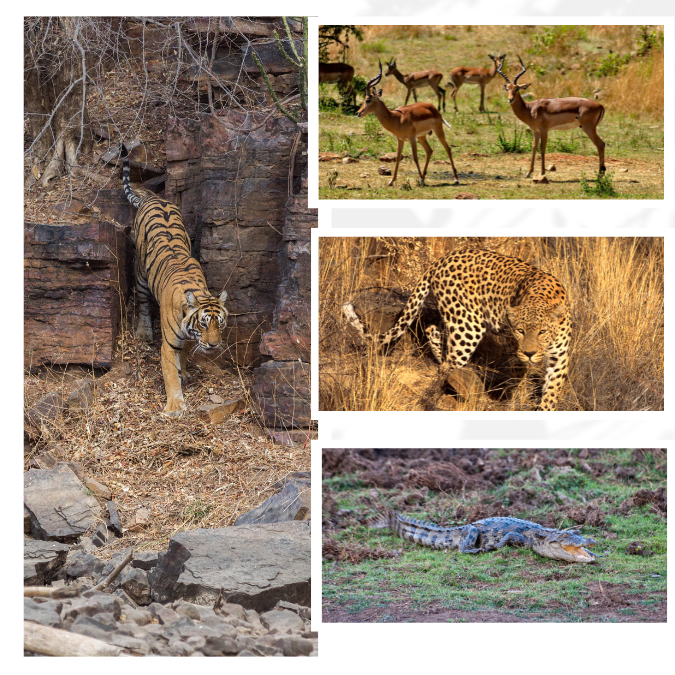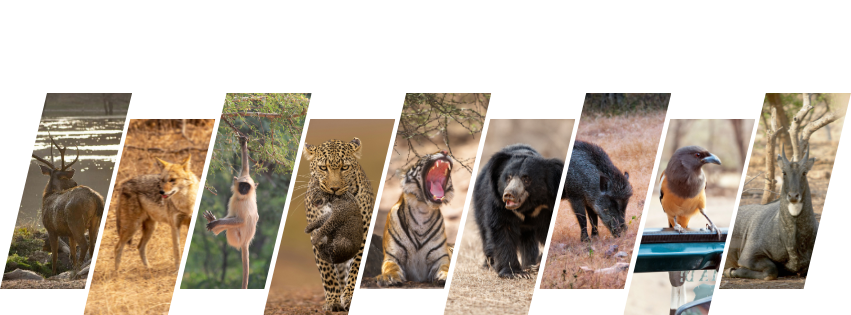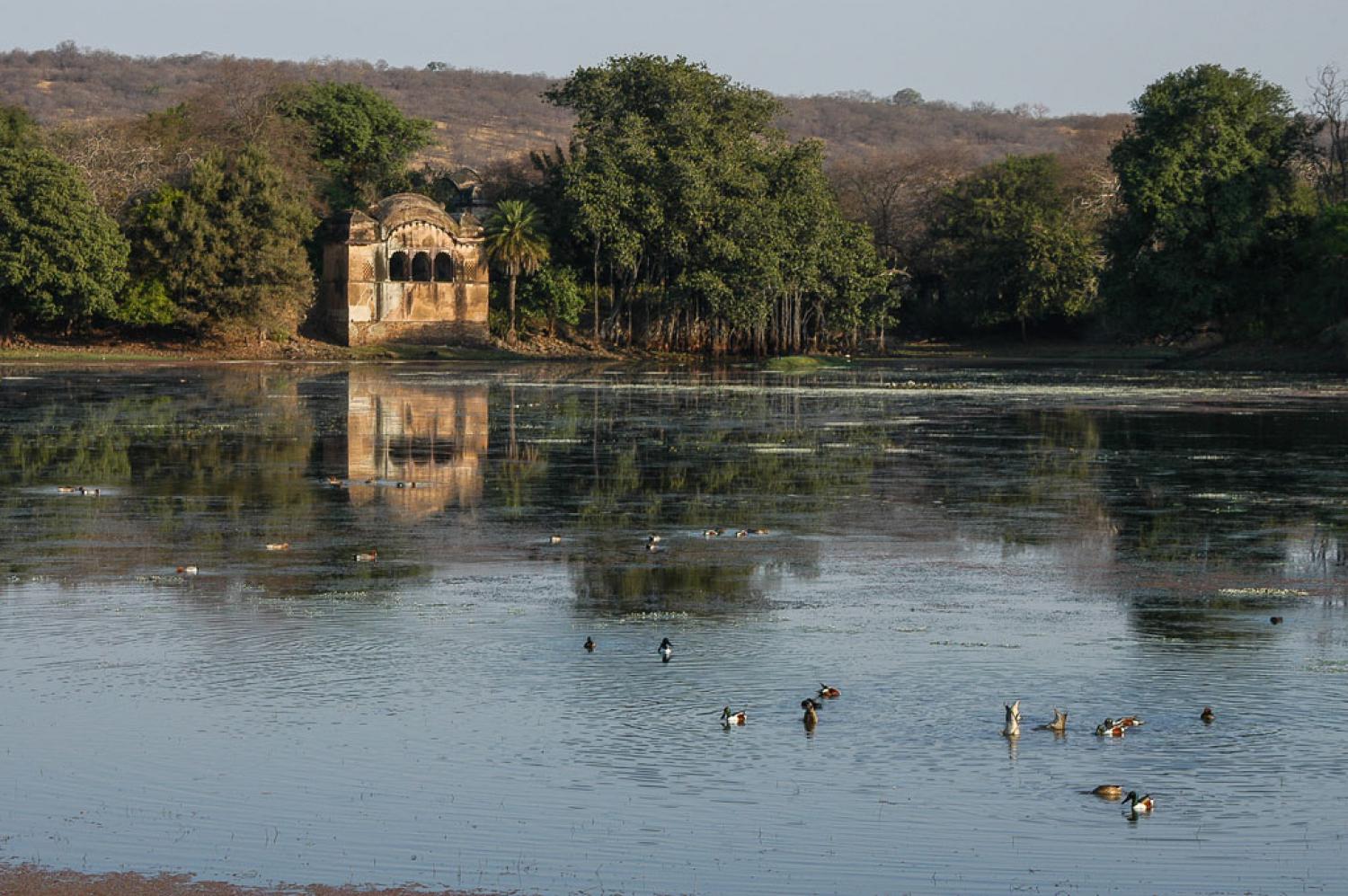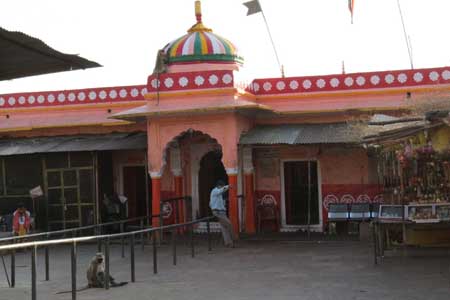Ranthambore National Park India-Explore the Land of Tigers

Unveiling the Kingdom of Tigers and Untamed Beauty
Welcome to Ranthambore National Park, India’s premier wildlife destination nestled in Sawai Madhopur, Rajasthan. Known for its Royal Bengal Tigers, ancient forts, scenic lakes, and diverse wildlife, Ranthambore is a top-rated choice for jungle safari in India. Spread across 392 square kilometers, the park features 10 safari zones, each offering a unique chance to witness wild tigers, leopards, sloth bears, jackals, hyenas, and over 270 species of birds. Whether you’re a photographer, adventurer, or family traveler, Ranthambore promises an unforgettable safari experience in the heart of nature.
Explore thrilling morning and evening safaris, guided by expert naturalists. Book your Ranthambore safari online and secure your seat in India’s wild heartland.
🐅 Spot iconic tigers like Sultana T-107, Riddhi T-124, and Noor T-39 in their natural habitat .
📍Just 10 km from Sawai Madhopur Railway Station and easily accessible from Jaipur International Airport.

Ranthambore Safari Timings
Monthly Timetable
The timings for safari at Ranthambore National Park in India may vary depending on the season. Generally, there are two safari slots available each day, one in the morning and one in the afternoon. The morning safari usually starts early, around sunrise, while the afternoon safari starts in the afternoon and ends before sunset.Ranthambore is considered the top destination for a Rajasthan tiger safari, attracting visitors from around the world.
Months | Morning Safari | Evening Safari |
|---|---|---|
October 1 to October 31 | 6.30 a.m. to 10 a.m. | 2.30 p.m to 6.00 p.m |
November 1 to January 31 | 7.00 a.m to 10.30 a.m | 2.00 p.m to 5.30 p.m |
February 1 to March 31 | 6.30 a.m to 10.00 a.m | 2.30 p.m to 6.00 p.m |
April 1 to May 15 | 6.00 a.m to 9.30 a.m | 3.00 p.m to 6.30 p.m |
May 15 to sep 30 | 6.00 a.m to 9.30 a.m | 3.30 p.m to 7.00 p.m |
🛑 Note: On Wednesdays, Zones 1 to 5 remain closed, while Zones 6 to 10 remain open and operational for safari bookings.
Ranthambore Safari Pricing
Pricing Details
Ranthambore National Park offers an incredible opportunity to explore the untamed wilderness and witness the majestic wildlife in their natural habitat. As you plan your visit to this renowned national park, it’s essential to understand the pricing structure for safaris to make informed decisions and ensure an unforgettable experience within your budget. Ranthambore is among the top choices for wildlife safari in Rajasthan, attracting nature enthusiasts eager to spot tigers in Rajasthan’s dense forests.
Safari | Indian National (Per Person ) | Foreign National | Time Duration | Zone |
|---|---|---|---|---|
Canter Safari | 1600.00 INR | 3800.00 INR | 3.30 Hrs | Single Zone |
Gypsy Safari | 2200.00 INR | 4200.00 INR | 3.30 Hrs | Single Zone |
Private Gypsy | 13200.00 INR | 25200.00 INR | 3.30 Hrs | Single Zone |
Private Canter | 30,000.00 INR | 70000.00 INR | 3.30 Hrs | Single Zone |
Tatkal Gypsy | 30000.00 INR | 45000.00 INR | 3.30 Hrs | Single Zone |
Current Booking | 2000 INR (Canter Safari) | 4000 INR (Canter Safari) | 3.30 Hrs | Single Zone |
Ranthambore Tigers Territory
Tigers Territory Details

Zone | Tiger | Information |
|---|---|---|
Zone 1 | 🐅T-107 Sultana & Cubs, 🐅T-01, 🐅T-105 Noori | 👉KNOW MORE |
Zone 2 | 🐅T-107 Sultana & Cubs, 🐅T-60, 🐅T-119 | 👉KNOW MORE |
Zone 3 | 🐅Riddhi -T124 & Cubs, 🐅T-120 & Cubs | 👉KNOW MORE |
Zone 4 | 🐅Shakti T-111, 🐅T-19, 🐅T-121 | 👉KNOW MORE |
Zone 5 | 🐅T-102, T-125, 🐅T-103, 🐅T-41 | 👉KNOW MORE |
Zone 6-10 | 🐅Noor T-39 & Cubs, 🐅T-58, 🐅T-114 & Cubs, 🐅T-108, 🐅T-99 & Cubs, 🐅T-62, 🐅T-99, 🐅T-108 | 👉KNOW MORE |
Tigers of Ranthambore (Zone-wise Sighting)
Current Tiger Sightings by Zone
🐯 Tiger Sightings by Zone
⚠️ Click any bar to view the last tiger sighting update for that zone.
📌 Click zone buttons to see zone specialty.
Things to Do Beyond Safari
More Adventures Around Ranthambore

Ranthambhore National Park, located in the state of Rajasthan, India, is renowned for its majestic Tiger Reserve, which is one of the country’s largest and most famous tiger reserves. Besides tiger sightings, there are numerous other activities and attractions to explore in and around Park.
Jungle Safari
A jungle safari is an exciting adventure that involves exploring and observing wildlife in their natural habitat, typically in dense forested areas known as jungles or rainforests. These safaris provide an opportunity to see a wide variety of animals, birds, and plant species that are unique to these ecosystems.
Bird Photography
Tiger Reserve offers fantastic opportunities for photography enthusiasts. Capture the majestic tigers, stunning landscapes, and vibrant culture of the region through your lens. Early mornings and late afternoons are the best times for bird photography as the lighting is soft and warm.
Chambal Safari
The Palighat Chambal Safari is a popular tourist attraction located in the Chambal Valley of India. It offers visitors a unique opportunity to explore the diverse wildlife and scenic beauty of the region. The safari takes place along the Chambal River, which is known for its rich biodiversity.
Ranthambore fort
Sightseeing in Ranthambore is an Amazing Experience That Everyone Should Try at Least Once in Their Lifetime. Embark on a Trip and Be Amazed by the Unforgettable Beauty of the Jungle in the Ranthambore Tiger Reserve. Get Ready for an Adventure Like No Other
Famous Attractions within national Park
Attraction Details
Tourists Places – Ranthambore National Park is one of the most popular tourist destinations in India. There are many places to see in Sawai Madhopur like Fort, Wildlife Sanctuary, Lake, Safari ,Kachida Valley, Padam Talao, hotels,Trinetra Temple etc.

🏰Ranthambhore Fort
Visit the historic Ranthambhore Fort, a UNESCO World Heritage Site that dates back to the 10th century. Explore the impressive architecture, ancient temples, and enjoy panoramic views of the surrounding landscape

🏞️Padam Talao
In addition to its natural beauty, Padam Talao is also home to the iconic Jogi Mahal, a historic hunting lodge situated on the lakeshore. Jogi Mahal offers stunning views of the lake and surrounding wilderness.

🌄Kachida Valley
Kachida Valley is a picturesque and rugged terrain within the park that spans approximately 500 hectares. It is characterized by its undulating landscape, rocky outcrops, and dense vegetation, offering a unique habitat .

🛕Trinetra Temple
Pay a visit to the Trinetra Ganesh Temple located within the Ranthambhore Fort. This temple is dedicated to Lord Ganesha and is believed to be one of the oldest Ganesha temples in Rajasthan.
📷 Perfect for nature photography, family trips & wildlife tours
Overview of Ranthambore Tiger Reserve
Quick Facts About the Reserve
Located in Sawai Madhopur, Rajasthan, Ranthambore Tiger Reserve spans 1,334 square kilometers, combining rich biodiversity with historical and cultural significance. Originally declared a wildlife sanctuary in 1955, it was included under Project Tiger in 1973 and gained full status as a national park in 1980. The reserve is home to a wide range of wildlife including Royal Bengal Tigers, Leopards, Sloth Bears, Striped Hyenas, Sambar Deer, Jackals, and Indian Foxes, along with over 270 bird species.
Visitors can explore 10 safari zones through morning and afternoon Jeep or Canter safaris. The best time to visit is from October to June, with frequent wildlife sightings and favorable weather. Nearby attractions include the Ranthambore Fort, Trinetra Ganesha Temple, and picturesque lakes like Padam Talao. With convenient access from Sawai Madhopur Railway Station and Jaipur International Airport, Ranthambore is a prime destination for wildlife and nature lovers.
Location- Sawai Madhopur, Rajasthan, India
Established: Sanctuary (1955), Tiger Reserve (1973), National Park (1980)
Total Area: 1,334 km² (515 sq mi)
Major Wildlife: Tigers, Leopards, Sloth Bears, Hyenas, Sambar, Crocodiles, etc.
Bird Species: Over 270
Safari Types: Jeep & Canter (Morning & Afternoon)
Safari Zones: 10 Zones
Climate: Hot summers (Apr–Jun), pleasant winters (Oct–Mar)
Nearest Railway Station: Sawai Madhopur
Nearest Airport: Jaipur International Airport
🎯 Why Choose Ranthambore?
What Makes It Unique
🐯 Over 80 Bengal Tigers
🌍 10 Safari Zones
🔥 Hotspots: Zones 3, 4 & 5
🏞️ UNESCO World Heritage Fort
📸 Ideal for Wildlife Photography
✅ Open from October to June
📢 Why Book With Trip to Ranthambore?
What We Offer
✅ Trusted Local Safari Experts
🧭 Real-time Zone Allocation
👨💼 Dedicated Travel Advisors
🏨 Ranthambore Hotel & Resort Bookings
🛶 Chambal Safari & Sightseeing Packages
🧳 Visitor Tips Before You Go
Plan Smart, Travel Safe
✅ Book safaris 60–90 days in advance
📄 Carry valid ID proof for all travelers
👕 Wear neutral clothes; avoid bright colors
💧 Bring water, binoculars, camera
🤫 Respect wildlife – no feeding, no loud noise
📞 Call or WhatsApp: +91 7014543770 / +91 7742318486 📧 Email: info@ranthamborenationalpark-india.com
TIGER CONSERVATION IN RANTHAMBORE
Project Tiger & NTCA Efforts
In 1973, major conservation efforts began in the Ranthambore Tiger Reserve with the launch of Project Tiger. This initiative was started by the Government of India after a 1972 census revealed a dramatic decline in the country’s tiger population due to poaching and habitat loss.Ranthambore became a key sanctuary under this project, with zones categorized into core areas—where human activity is restricted—and buffer zones, which are managed to allow eco-friendly development.As a prominent tiger reserve in Rajasthan, Ranthambore continues to play a key role in India’s tiger conservation success story.
To support and monitor the project’s effectiveness, the National Tiger Conservation Authority (NTCA) was established. The NTCA, backed by the Wildlife Protection Act (amended in 2006), plays a vital role in tiger monitoring, anti-poaching efforts, and tourism regulation.Thanks to these initiatives, Ranthambore’s tiger population increased from 66 in 2019 to 81 in 2021. Nationally, India’s tiger population is growing at an annual rate of approximately 6%. NTCA member SP Yadav stresses that involving local communities in conservation and eco-tourism jobs is key to sustaining this success.
